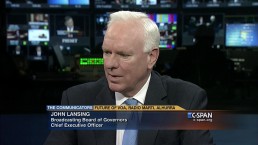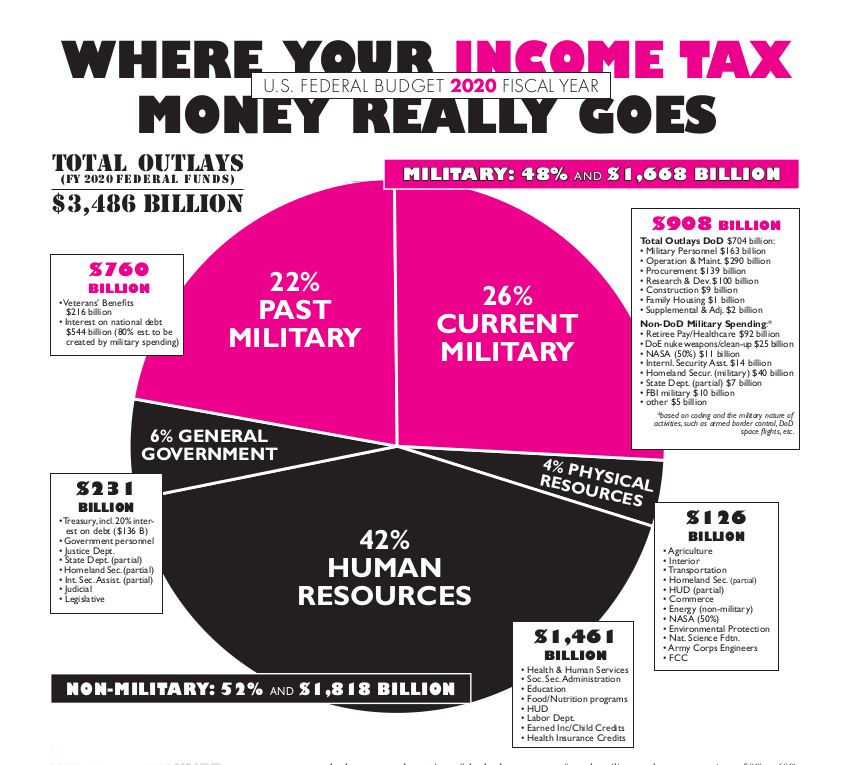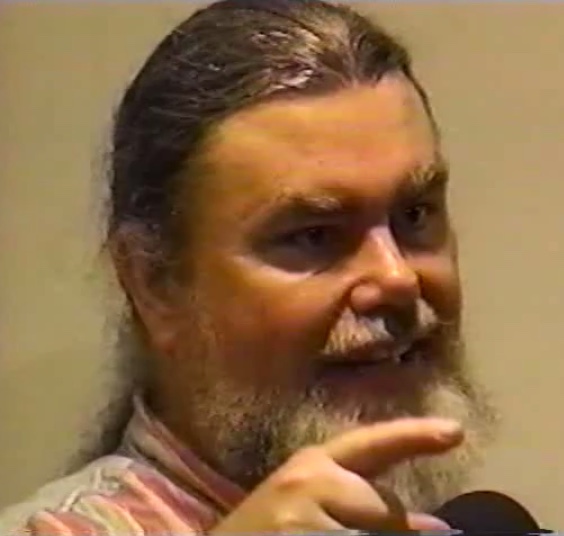Will NPR Now Officially Change Its Name to National Propaganda Radio?
The following highlights a current potent element of U.S. state propaganda in the closing months of the second decade of the new century. In addition to the sources cited in the opening below, a helpful summary of the history of CIA manipulation of US monetized media is the enhanced presentation of James Tracy’s exposition: “The CIA and the Media: 50 Facts the World Needs to Know”.
Will NPR Now Officially Change Its Name to National Propaganda Radio?
by Edward Curtin
Off Guardian
8 Sep 2019
Back in the 1960s, the CIA official Cord Meyer said the agency needed to “court the compatible left.” He knew that drawing liberals and leftists into the CIA’s orbit was the key to efficient propaganda.
Right-wing and left-wing collaborators were needed to create a powerful propaganda apparatus that would be capable of hypnotizing audiences into believing the myth of American exceptionalism and its divine right to rule the world.
The CIA therefore secretly worked to influence American and world opinion through the literary and intellectual elites.
Frances Stonor Saunders comprehensively covers this in her 1999 book, The Cultural Cold War: The CIA And The World Of Arts And Letters, and Joel Whitney followed this up in 2016 with Finks: How the CIA Tricked the World’s Best Writers, with particular emphasis on the complicity between the CIA and the famous literary journal, The Paris Review.
By the mid-1970s, as a result of the Church Committee hearings, it seemed as if the CIA, NSA, FBI, etc. had been caught in flagrante delicto and disgraced, confessed their sins, and resolved to go and sin no more.
Then in 1977, Carl Bernstein wrote a long piece for Esquire – “The CIA and the Media” – naming names of journalists and media (The New York Times, CBS, etc.) that worked hand-in-glove with the CIA, propagandizing the American people and the rest of the world.
It seemed as if all would be hunky-dory now with the bad boys purged from the American “free” press. Seemed to the most naïve, that is, by which I mean the vast numbers of people who wanted to re-stick their heads in the sand and believe, as Ronald Reagan’s team of truthtellers would announce, that it was “Morning in America” again with the free press reigning and the neo-conservatives, many of whom had been “converted” from their leftist views, running things in Washington.
So again it is morning in America this September 6, 2019, and the headline from National Public Radio announces the glad tidings that NPR has named a new CEO. His name is John Lansing, and the headline says he is a “veteran media executive.” We are meant to be reassured.
It goes on to say that Mr. Lansing, 62, is currently the chief executive of the government agency, The US Agency for Global Media, that oversees Voice of America, Radio and Television Marti, and Radio Free Europe/Radio Liberty, among others.
We are furthermore reassured by NPR that Lansing “made his mark in his current job with stirring defenses of journalism, free from government interference.”
The announcement goes on to say:
Lansing has earned an advanced degree in political agility. At the U.S. Agency for Global Media, Lansing championed a free press even as leaders of many nations move against it.
‘Governments around the world are increasingly cracking down on the free flow of information; silencing dialogue and dissent; and distorting reality,’ Lansing said in a speech he delivered in May to the Media for Democracy Forum. ‘The result, I believe, is a war on truth.’
He continued: ‘Citizens in countries from Russia to China, from Iran to North Korea, have been victimized for decades. But now we’re seeing authoritarian regimes expanding around the globe, with media repression in places like Turkey and Venezuela, Cambodia and Vietnam.’
So we are reassured that the new head of NPR, the chief of all U.S. propaganda, is a champion of a free press. Perhaps NPR will soon enlighten the American public by interviewing its new head honcho and asking him if he thinks Julian Assange and Chelsea Manning, by exposing America’s war crimes, and Edward Snowden, by exposing the U.S. government’s vast electronic surveillance programs of its own citizens, deserve to be jailed and exiled for doing the job the American mainstream “free press” failed to do. What NPR failed to do.
Perhaps they will ask him if he objects to the way his own government “interfered” in the lives of these three courageous people who revealed truths that every citizen of a free country is entitled to. Perhaps they will ask him if the U.S. government’s persecution of these truthtellers is what he means by there being “a war on truth.”
Perhaps they will ask him if he thinks the Obama and Trump administrations have been “distorting reality” and waging a war on truth.
Perhaps not. Of course not.
Don’t laugh, for the joke will be on you if you listen to NPR and its sly appeal to “liberal” sensibilities. If you are wondering why we have had the Russia-gate hoax and who was responsible (see/hear Russia expert Prof. Stephen Cohen here) and are now involved in a new Cold War and a highly dangerous nuclear confrontation with Russia, read Lansing’s July 10, 2019 testimony before the House Appropriations Sub-Committee on State, Foreign Operations and Related Programs: “United States Efforts to Counter Russian Disinformation and Malign Influence.”
Here is an excerpt:
USAGM provides consistently accurate and compelling journalism that reflects the values of our society: freedom, openness, democracy, and hope. Our guiding principles—enshrined in law—are to provide a reliable, authoritative, and independent source of news that adheres to the strictest standards of journalism…
Russian Disinformation. And make no mistake, we are living through a global explosion of disinformation, state propaganda, and lies generated by multiple authoritarian regimes around the world. The weaponization of information we are seeing today is real. The Russian government and other authoritarian regimes engage in far-reaching malign influence campaigns across national boundaries and language barriers.
The Kremlin’s propaganda and disinformation machine is being unleashed via new platforms and continues to grow in Russia and internationally. Russia seeks to destroy the very idea of an objective, verifiable set of facts as it attempts to influence opinions about the United States and its allies. It is not an understatement to say that this new form of combat on the information battlefield may be the fight of the 21st century.
Then research the history of Radio Free Europe/Radio Liberty, the Voice of America, Radio and Television Marti, etc. You will be reassured that Lansing’s July testimony was his job interview to head National Propaganda Radio.
Then sit back, relax, and tune into NPR’s Morning Edition. It will be comforting to know that it is “Morning in America” once again.
JFK: A President Betrayed
For those of you who have not seen the documentary film, “JFK: A President Betrayed” (very worthwhile, I believe), I suggest you read “JFK: Destiny Betrayed,” by Jim DiEugenio. Jim’s excellent review of this fine documentary film without specifically addressing the JFK assassination directly sets the stage and plainly explicates why JFK was killed by our warfare state.
—Vincent Salandria, 2019
JFK: A President Betrayed
Cory Taylor, Director, Agoro Productions, 2013
From Jim DiEugenio’s review:
Taylor does not really approach the Kennedy case from a forensic or investigative viewpoint. What he does in his two-hour documentary is take a look at Kennedy's foreign policy during his presidency, and try to show how some people within his own administration opposed it. To me, it is clear that the main inspiration for the film is the influential Jim Douglass tome, JFK and the Unspeakable.
One of the main attributes of the film is that it uses some credible, and new, sources as interview subjects. And it bypasses the accepted mainstream historians who have, in reality, done little real research on JFK. Or, even worse, ignored Kennedy's genuine interests. Therefore, to Taylor's credit, one will not see the likes of Robert Dallek, Richard Reeves or Larry Sabato pontificating boringly and deceptively in this film. Some of the main academics in the documentary are University of Texas professor Jamie Galbraith, son of Kennedy aide and later Ambassador to India John K. Galbraith; Gareth Porter, a lecturer, journalist, and author who has written four books on the Vietnam War; former Wall Street journalist and editor Frederick Kempe, author of Berlin 1961; University of New Orleans professor Gunter Bischof, a specialist in Eastern European history. In addition to that, we see journalist Michael Dobbs, author of one of the better studies of the Missile Crisis, One Minute to Midnight, Peter Kornbluh, author and editor of Bay of Pigs Declassified, and Robert Schlesinger, son of Kennedy aide Arthur Schlesinger. This collection of commentators all makes for a notable improvement over the usual Dallek/Reeves/Sabato banal tendentiousness.
But where Taylor has really done some interesting work is in the direct witnesses he has secured. For instance, Taylor interviews the interpreters at the Vienna Summit Conference, the late Viktor Sukhodrev (translator for Nikita Khrushchev) and Alex Akalovsky (interpreter for President Kennedy). In addition to Sukhodrev, there is also Sergei Khrushchev, son of the former Russian premier. Also on screen is the rather seldom seen Thomas L. Hughes. Hughes was an assistant to Chester Bowles in the Kennedy administration, and later succeeded Roger Hilsman as director of Intelligence and Research at the State Department. Lawyer Willam Vanden Heuvel was an advisor to Attorney General Robert Kennedy, and later wrote a book about RFK. Finally, in a real surprise, Taylor tracked down Andrea Cousins and Candis Cousins Kerns. These are the daughters of Saturday Review editor Norman Cousins. Cousins had been a tireless advocate for nuclear disarmament since, literally, the day after Hiroshima. As Douglass pointed out in his book, Cousins served as a kind of go-between between the Vatican, the Kremlin and the White House in their mutual efforts to construct a Nuclear Test Ban Treaty. He then wrote about it in his (much ignored) 1972 book, The Improbable Triumvirate: John F. Kennedy, Pope John, Nikita Khrushchev - An Asterisk to the History of a Hopeful Year, 1962-1963. It's quite a promising roster. And it does not disappoint....
All in all, this is one of the better documentaries about Kennedy's presidency. My only regret about it is that, although it presents much of the information from the Douglass book on screen for the first time, the Douglass book is not state of the art any more. Books by Philip Muehlenbeck and Robert Rakove have, in some significant ways, superseded it. (See Betting on the Africans and Kennedy, Johnson and the Nonaligned World respectively). These two books show that Kennedy's foreign policy was even more revolutionary than depicted here.
But that is a cavil. This film is much worth seeing. And it deserved a much larger platform than it got last year. Right now, it's the best screen depiction of Kennedy's foreign policy that I know of.
“... not merely peace for Americans...” Banning Nuclear Weapons and Retrieving the Legacy of President Kennedy’s Last Year
56 years ago on 10 June 1963 President Kennedy gave the Commencement Address at American University. His focus was “the most important topic on earth: peace” and includes the inescapable reality of our species’ oneness:
...in the final analysis, our most basic common link is that we all inhabit this small planet. We all breathe the same air. We all cherish our children’s futures. And we are all mortal.
Calling for an end to the Cold War, the intelligence, logic, and coherent thinking of this speech was then, and is still now, ahead of its time.
A new pamphlet with the above title has been published on 10 June 2019 and includes consideration of grasping and applying the iron logic of the nuclear age.
The logic of this situation is: “What we do to the other, (in this case Russia) will be done to us.” If this is the case, then we must do unto them as we want them to do unto us. The moral imperative “Do unto others as you would have them unto you” has become a practical necessity....
[I]s it possible that what is being revealed to us is the fallacy that security can be found in domination—dominating other people, dominating other nations, dominating nature? If what we do unto others will be done unto us, then in the end we and the other are not separate. What we are doing to others, we are doing to ourselves. An awareness of this reality can be the basis of an awakening in our thinking, feeling and imagination, an awakening of our actions informed by a new sense of human solidarity and collective responsibility....
If we want other countries to forgo trying to achieve security through acquiring nuclear weapons, are there other ways to help them be more secure? In the midst of the looming danger of climate change, imagine how nuclear disarmament and disarmament in general might affect our world. By relinquishing the quest for security through destructive power and developing an international framework for security based on peaceful cooperation, might we develop the social institutions, the spiritual perspective, and the material resources to get out of the nuclear war we are in and deal with the threat of climate change?...
In our quest for a different vision and path for the United States and the world, it is critical to educate ourselves about a twelve month period from the fall of 1962 until the fall of 1963, when President John F. Kennedy was assassinated. Very few are aware of this year in US history. It was during this twelve month period that the United States took a fundamentally different approach to the ‘Cold War,’ nuclear weapons, nuclear war, and the conflict with what was then the Soviet Union. This was the result of a radical change in US policy, because of the dramatic shift in President Kennedy’s thinking after he had endured the Cuban Missile Crisis. During this period President Kennedy publicly displayed an understanding of much that is being said in this pamphlet and began to implement this thinking by turning it into policy.
By understanding the concerns of the leaders of the Soviet Union and their people and expressing that understanding in words and actions, President Kennedy was able to recruit a similar reaction from the other side. In this brief period we can see clearly how instead of the United States and the Soviet Union viewing each other as evil empires and enemies, they began to see each other and work together as partners in survival.
The murder of President Kennedy terminated this process because we, ordinary citizens, were not sufficiently aware and not sufficiently organized to demand that the process of peace building and partnership continue. This is our responsibility—to understand President Kennedy’s legacy and to carry it forward.
In order to understand President Kennedy’s thinking, we must turn to a speech he gave at American University on June 10, 1963.
In this speech Kennedy discussed the challenges of peace in the nuclear age. Anyone concerned about pursuing this partnership for our survival should read, or listen to, or watch this speech, While Kennedy was speaking about US relations with the Soviet Union, his insights are just as relevant today in regard to US-Russia relations.
We urge you to think about what has been said here, and not turn away. Study President Kennedy’s speech and see to it that family and friends do so also. This is not something any of us can face alone. We must face it together. Today the struggle to ban nuclear weapons is perhaps the leading edge of the peace movement, but the struggle for peace is complex and the forces behind nuclear weapons and war in general are powerful. If we cherish our children’s future, we must take up the challenge.
The pamphlet encourages readers to meet in groups, become conversant with the materials presented and engage in multiple strategies to work for the abolition and dismantling of all nuclear weapons as well as fulfilling the final portion of the objective stated in Article VI of the Nuclear Non-Proliferation Treaty, “complete disarmament under strict and effective international control.”
The complete pamphlet is available online at: ratical.org/ban-n-weps. It is also available in printed form by sending e-mail to: peacetaskforceFCCPR@gmail.com.
Taxation With Representation
(Click on an image to go to its source.)
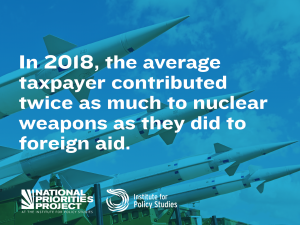 This is an excerpt from Taxation With Representation, written by John Judge in 2001:
This is an excerpt from Taxation With Representation, written by John Judge in 2001:
Taxes are indeed our money, and therefore we should be allowed to spend them as we see fit. Taxes, if paid by the people, should be directly allocated by the people. Bush appeals to the selfish position of those who do not wish to pay taxes for social services or welfare, but are fine with paying for the military and CIA that protect their wealth, privilege and investments here and abroad. He hands us back a rebate which is little more than chump change after he has taken out the massive ($238 billion) Pentagon budget, the increased CIA budget, and cut the social services once more. What is the average citizen to do with $300? Will it educate the children? Will it pay for health care? Or is it just meant to take the edge off the gouging profits of the rate hike at our gas pumps this year? ...
I propose that if we are to pay any tax on income exchanged for labor, it should be directly allocated by each taxpayer to whatever programs they feel are a priority. The net effect of a tax cut and a Pentagon increase has to mean a social services cut in education, health, infrastructure, or assistance. I would propose that the corporations pay a fair share but have no power in its allocation. Once the collective will was clearly expressed by compiling a taxpayers allocation pie, the corporate funds would be allocated proportionately as well, or used to create an emergency backup fund for direct allocation when conditions arose or funds allocated were insufficient to public needs and desires.
My first approach would be to plant the seed of this idea, for which I have found almost universal acceptance among diverse groups of people: implement it without binding the government at first. A simple three-layer carbon form could be mailed to all taxpayers in a given area, along with printed pie charts showing how current taxes are being spent at local, state and national levels. Taxpayers would be invited to fill out their own charts, showing their priorities on the form. One copy would be added to their payments of local, state and federal taxes, enclosed with the tax return. This would indicate their intent and educate them about whose money it is. The second copy would be returned to the public interest group doing the mailings, and they would be complied into several “People’s tax pies” for each municipality, county and state. At a public meeting and press conference, these pies could be compared to the current spending pies based on the allocation voting records of their elected “representatives”. I can guarantee you they would not be the same pies. The elected representatives could be invited to attend and explain who they really represent, or why they feel better qualified to spend the people’s money than the people themselves.
Once the principle was established it would be easy enough to make the last page of any tax form an allocation chart and let the taxpayers allocate the funds. A one-year lag time could be established, to give time for corrections by way of referendum or reallocation of the corporate based emergency funds if needed. This then would truly represent taxation with representation, and our money would be allocated democratically and directly by the people. The current unrepresentative allocation that bloats the coffers of the military-industrial complex and guts the social benefits of this productive economy could be put to use to end poverty, homelessness, miseducation, and many other social ills, as the people might so direct.
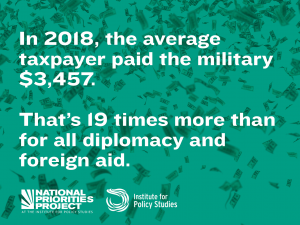 I came upon this idea during my college years, when I was forced to pay a $50 “matriculation fee” each trimester, and looked into where it was being spent. A full $28 went for sports and sporting events, which I had no interest in. A meagre $2 went for student government, another $2 for the student newspaper, and a similar amount for cheerleaders at sport events, an ROTC rifle spinning outfit, and a sorority that existed solely to serve the needs of ROTC cadets. My goal was to regain student control over the allocation of these funds, but I started small. I proposed that the $2 student government fee be reduced by the actual costs of the administrative functions, ombudsman and student lawyer, and that the rest be directly allocated by students who would assign 25 cents to each signature on public, numbered petitions for any proposed function or activity. At this point the student congress, which had been in charge of allocating the funds, set up a howl. “Students don’t know how to spend their own money!” they informed us. I then asked exactly who they represented. I am sure that the Congressional and local elected officials would put up a similar hue and cry, and thereby expose their elitist and neo-colonial attitudes towards their constituencies, who they never even consult in making tax allocation decisions.
I came upon this idea during my college years, when I was forced to pay a $50 “matriculation fee” each trimester, and looked into where it was being spent. A full $28 went for sports and sporting events, which I had no interest in. A meagre $2 went for student government, another $2 for the student newspaper, and a similar amount for cheerleaders at sport events, an ROTC rifle spinning outfit, and a sorority that existed solely to serve the needs of ROTC cadets. My goal was to regain student control over the allocation of these funds, but I started small. I proposed that the $2 student government fee be reduced by the actual costs of the administrative functions, ombudsman and student lawyer, and that the rest be directly allocated by students who would assign 25 cents to each signature on public, numbered petitions for any proposed function or activity. At this point the student congress, which had been in charge of allocating the funds, set up a howl. “Students don’t know how to spend their own money!” they informed us. I then asked exactly who they represented. I am sure that the Congressional and local elected officials would put up a similar hue and cry, and thereby expose their elitist and neo-colonial attitudes towards their constituencies, who they never even consult in making tax allocation decisions.
Are You Scared Yet? The War Without an Enemy - Terrorism and the Strategy of Tension
A talk by John Judge in Santa Monica, California, 1996. Video and audio recordings are available at the John Judge 1991 to 2014 Video Archive Listing. The venue for this talk was Deep River Books. John examined the current terrorist acts and their broader implications. Given five years before September 11, this talk has prophetic undertones.
An excerpt of the talk:
“[The American people have this lesson to learn: That] where justice is denied, where poverty is enforced, where ignorance prevails, and where any one class is made to feel that society is an organized conspiracy to [oppress], rob, and degrade them, neither persons nor property will be safe.”
Frederick Douglass, “Southern Barbarism,” 24th Anniversary of Emancipation, Washington, DC, 1886 in Philip Foner, ed. The Life and Writings of Frederick Douglass, Vol. 4 (New York: International Pub., 1950), 434.
I thought that that was an interesting insight and introduction into the situation that we’re in.
I titled the talk tonight, Are You Scared Yet? I did that, despite the fact that Jane Hunter has said, in one interview at least, that my lectures are like drugs in the sixties in that they paralyze people with fear and make them inactive. That’s not anything I’ve ever heard from an audience but it’s what she said about me. I think, in fact, my message, when read properly is more that people should calm down and try to distinguish what they’re being asked, or told, to be afraid of and what they ought to be afraid in reality which is generally hidden from them and the extent to which they ought to be afraid or ought to act instead.
I also knew a guy years ago when I worked in the anti-psychiatry movement, John Parkin, who said that he wanted to start a national campaign to abolish paranoia by elevating it to realistic fear. There isn’t a term in the English language that’s the opposite of paranoia, unless it’s just complacency. But there isn’t healthy or realistic fear that maybe somebody is doing something to you. William S. Burroughs said, that paranoia is having all the facts. So I try to get as many as I can, ’cause I’m trying to get there.
But my purpose, of course, isn’t to make other people paranoid. My purpose is to hopefully enlighten people about what’s happening around them and what they ought to be putting their focus on. Charlie Manson said, paranoia is heightened awareness. Michael McClure said that even paranoids have enemies. I know I have some. But I don’t spend my life looking over my shoulder, I try to look in front of me and see what’s coming.
I found a quote this year. A friend of mine, Wendy Govier, works with Adobe up in Palo Alto and her boss has an extant copy of the Bill of Rights so he put it up and digitized it onto the web so people could download the Bill of Rights. She asked me to get some background. I found a quote from Thomas Jefferson about the Bill of Rights and the Constitution. After he read the Constitution that had been proposed; he was in France at the time because they got the real radical people out of the country as quickly as they could. He got a look at it and he said “I [will] now add what I do not like.” This was about the Constitution.
First, the omission of a bill of rights providing clearly and without the aid of sophisms for freedom of religion, freedom of the press, protection against standing armies, restriction against monopolies, the eternal and unremitting force of haebeus corpus laws, and trails by jury in all matters of fact, trail by the laws of the land not the law of nations. Let me add that a bill of rights is what the people are entitled to against every government on Earth, general or particular, and what no just government should refuse, or rest on inference.
So they were actually unable to get state ratification of the Constitution as they wrote it without putting in at least the early Bill of Rights and since then of course different ammendments have expanded the idea of rights. I think that it should be seen as a dynamic thing, not a sacralized text that’s frozen in history because the only way it’s really preserved is hermetically sealed there at the National Archives. It’s only preserved in terms of a conceptualization by the action of people in the time in which it is. Our task is the same as Jefferson’s task was in his era. He was of course blind to things that we now see. Who knows, three hundred years from now how people will laugh at our conception of liberation and interaction, should we last so long.
It’s our duty, I think, to define our liberation in our own time. And to move in that direction on behalf of not only ourselves but any kind of future that we want to have for people that come after us.
Historian Howard Zinn pointed out in his book, Declarations of Independence, that to depend on the simple existence of a Bill of Rights as a guarantee of our freedom is to risk liberty and life itself. Only two decades ago, U.S. citizens refused to sign a copy of the Bill of Rights on public streets claiming that the ideas in it were Communistic. So it needs not so much to be preserved as reprinted and distributed. It’s not taken very seriously except by the people who want to use it for their own purposes.
And I included on the flyer tonight also one quote by Ben Franklin who said that those who would surrender liberty for security deserve neither. I think that’s really the themes of what I’m wanting to talk about.
It has been classic within governments, at least in the 19th and 20th centuries, and probably earlier but we don’t have as good a history, to use what are known now as provocateurs. The function of a provocateur for the government or the ruling class or the state is to infiltrate opposition groups and then encourage within those groups violence or reaction against the state which can then be used in turn by the state as it’s excuse for repressing the group. So you provoke a response.

